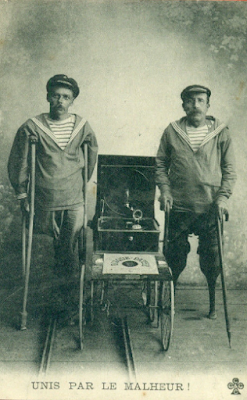The recently invented portable phonograph brought the melodies of the music halls into hospitals crowded with wounded and dying men. Volunteer Aid Detachment (VAD) nurse Vera Britain wrote of the “blaring, blatant gramophones” that mixed with “people shouting or groaning after an operation.” She noted that “though the men found them consoling—perhaps because they subdued more sinister noises—they seemed to me to add a strident grotesqueness to the cold, dark evenings of hurry and pain” (Testament of Youth, 195-196).
Eva Dobell, a young woman from Gloucestershire, served for over three years as a VAD hospital nurse. Her poem “Gramophone Tunes” captures the dissonance between the music and the maimed men.
Gramophone Tunes
Through the long ward the gramophone
Grinds out its nasal melodies:
 “Where did you get that girl?” it shrills.
“Where did you get that girl?” it shrills.The patients listen at their ease,
Through clouds of strong tobacco-smoke:
The gramophone can always please.
The Welsh boy has it by his bed,
(He’s lame—one leg was blown away.)
He’ll lie propped up with pillows there,
And wind the handle half the day.
His neighbor, with the shattered arm,
Picks out the records he must play.
Jock with his crutches beats the time;
The gunner, with his head close-bound,
Listens with puzzled, patient smile:
(Shell-shock—he cannot hear a sound.)
The others join in from their beds,
And send the chorus rolling round.
Somehow for me these common tunes
Can never sound the same again:
They’ve magic now to thrill my heart
And bring before me, clear and plain,
Man that is master of his flesh,
And has the laugh of death and pain.
--Eva Dobell
 The gramophone crank is turned and popular music fills the hospital ward. The song alluded to in the poem “Where did you get that girl,” was a comic tune that charted at #6 in 1913. The song’s lyrics tell of a lonely lad whose luck turns, causing all who meet him to exclaim,
The gramophone crank is turned and popular music fills the hospital ward. The song alluded to in the poem “Where did you get that girl,” was a comic tune that charted at #6 in 1913. The song’s lyrics tell of a lonely lad whose luck turns, causing all who meet him to exclaim,Where did you get that girl? Oh! you lucky devil!
Where did you get that girl? Tell me on the level!
Have you ever kissed her? If she has a sister
Lead me, lead me, lead me to her mister!*
Yet the gramophone in the hospital shrilly “grinds out” the music – underscoring the forced nature of the gaiety. There’s a bitter irony in the fact that the men who sing about the “lucky devil” who got the girl have themselves suffered life-changing wounds, both mental and physical, that may doom them to unimaginable loneliness. With touching tenderness, the poem catalogues the men and their injuries: the Welsh boy with the amputated leg, the soldier with a shattered arm, and the shell-shocked man with “a puzzled, patient smile” who “cannot hear a sound.” These soldiers are free to “listen at their ease,” but it is because they are unable to either walk, work, or return home.
 And yet the music joins the men; in a spirit of friendly cooperation, the legless boy and one-armed man help one another to select the tunes and crank the player, while others on the ward join in sending the chorus “rolling round.”
And yet the music joins the men; in a spirit of friendly cooperation, the legless boy and one-armed man help one another to select the tunes and crank the player, while others on the ward join in sending the chorus “rolling round.” Even if they survive, the poem makes it clear that the war has changed these men forever. Siegfried Sassoon’s poem “They” makes a similar point: “When the boys come back/They will not be the same.” However, the last stanza of Dobell’s poem reminds us that the lives of women were also profoundly altered by the First World War. Everyone and everything has been changed forever.
Even the popular music of the day now echoes with the suffering and loss of the war. For those working in or confined to hospitals, music hall songs have become associated with the smell of gas gangrene and disinfectant, and yet the tunes will also be forever associated with the courage of men who struggled to master their flesh, to laugh and even sing while surrounded by death and pain.
--------------------------------------------------------------------------------------------------------------------------
*You can listen to an original recording of "Where did you get that girl" by clicking on the link in the poem.














